Research
Current Funded Projects
DataSENSE: NRT
NRT-HDR: Integrative Training in Data Science-Enabled Sensing of the Environment for Climate Adaptation (DataSENSE)
PI: Laura E. Brown
co-PIs: Dukka KC (CS), Wayne Gersie (VP-DI), Shiliang Wu (GMES), Thomas Oommen (GMES)
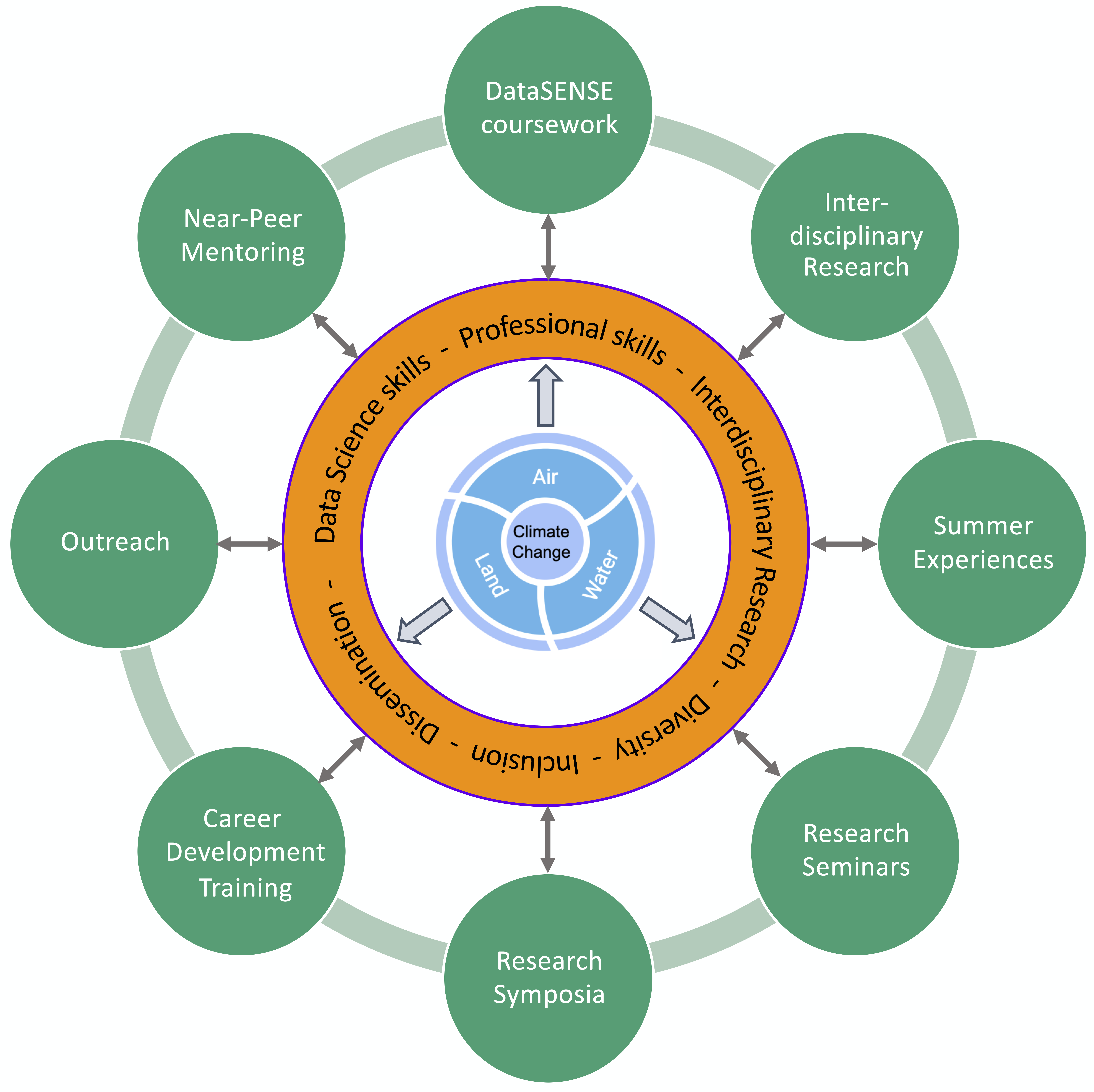 Climate change is one of the most complex issues that humankind is facing. Discovering new ways to understand and measure its profound impact on our land, water, and air is needed now, and in the years and decades to come. It is urgent that next generation of data scientists and engineers are ready to tackle this complex issue.
Climate change is one of the most complex issues that humankind is facing. Discovering new ways to understand and measure its profound impact on our land, water, and air is needed now, and in the years and decades to come. It is urgent that next generation of data scientists and engineers are ready to tackle this complex issue.
Helping to fill this need is Michigan Tech's Data Science-Enabled Sensing of the Environment for Climate Adaptation (DataSENSE) program. The just-funded project aims to inspire, educate, and prepare a talented cadre of Ph.D. students who wish to become experts in data science-enabled sensing of the environment. Awarded in August 2023, the grant is sponsored by a National Science Foundation (NSF) Research Traineeship (NRT) grant. The goal of the program is to deliver an integrative, culturally-responsive, and equity minded training, research, and mentoring experiences for graduate students.
DataSENSE students will have leadership opportunities through organizing aspects of the training activities, advancing professional skills in scientific communication, and career development training to grow skills in leadership, negotiation, team building, networking, and project management. Students will gain interdisciplinary knowledge through breadth, and also to gain a deeper knowledge specialization.
We are looking for interested graduate students to join the DataSENSE project. Funding is restricted to US citizens or permanent residents.
Funded by: National Science Foundation
Award #: 2244403
MRI - GPU Cluster
MRI: Acquisition of a GPU-accelerated cluster for research, training and outreach
PI: Dukka KC (CS)
co-PIs: Laura E. Brown, Issei Nakamura (Physics), Zhenlin Wang (CS), Jingfeng Jiang (BioMed Eng)
A multidisciplinary team at Michigan Technological University (MTU) proposed acquiring a massively parallel high-end graphics processing unit (GPU) accelerated cluster, called DeepBlizzard, that will enable fascinating and transformational research. The DeepBlizzard cluster, in combination with the scientific team’s disciplinary strengths, will provide an opportunity for an immediate upgrade to address the existing and ever-growing needs throughout MTU for an instrument with major computational capabilities. NVIDIA’s A100, A40, A30 are the proposed GPU architecture to accomplish the three requirements – top performance for deep learning and inference, the best performance for single, double, and mixed-precision calculation, and large processing power for extreme parallelism and simulation; these are all characteristics of the ongoing and proposed computational research endeavors at MTU.
DeepBlizzard will enable exciting and ground-breaking research in 4 main areas: applications of deep learning, advances in algorithms and data structures, simulation and modeling, and image analysis. The projects encompass applications and advances across chemistry, forestry, mathematics, physics, engineering (biomedical, mechanical, materials science), and computer science with researchers representing 4 colleges and 10 departments. The scientific team of 19 investigators whose research is described in Sec. b mentor 2 postdocs, 48 graduate and 16 undergraduate students who will directly benefit from the acquired GPU cluster.
Funded by: National Science Foundation
Award #: 2215734
RICA Project: Rich, Immediate Critique of Antipatterns
Supporting Learning and Enhancement of Programming Competencies Through Use of Immediate Critiques of Antipatterns in Novice Programmer Code
PI: Leo Ureel (CS/CLS)
co-PIs: Laura E. Brown, Michelle Jarvie-Eggart (EF), Jon Sticklen (EF)
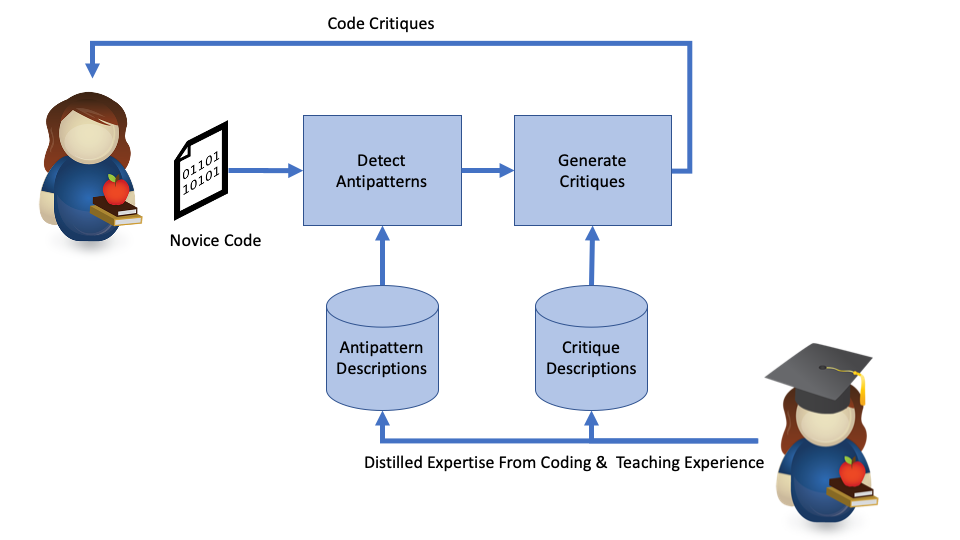 This project aims to serve the national interest by developing a system that will automatically detect coding mistakes made by students in programming classes. Providing rich, immediate feedback to students significantly improves learning outcomes resulting in better coding skills. Providing feedback in a timely manner using human graders is difficult due to rapidly increasing class sizes and instructor shortages. The goal of this project is to develop a system that can automatically provide high-quality feedback to students in introductory programming classes. Once developed, the system can be used by departments with limited resources to provide timely feedback to students. The result will be students with strong coding skills who will be ready to meet the current demand for programmers in the technology workforce.
This project aims to serve the national interest by developing a system that will automatically detect coding mistakes made by students in programming classes. Providing rich, immediate feedback to students significantly improves learning outcomes resulting in better coding skills. Providing feedback in a timely manner using human graders is difficult due to rapidly increasing class sizes and instructor shortages. The goal of this project is to develop a system that can automatically provide high-quality feedback to students in introductory programming classes. Once developed, the system can be used by departments with limited resources to provide timely feedback to students. The result will be students with strong coding skills who will be ready to meet the current demand for programmers in the technology workforce.
The project team will extend an existing system, WebTA, to study the common errors that are made by students in introductory programming courses. A mixed-methods approach will be used to evaluate the impacts of using WebTA as a learning tool in a first-year engineering course. The hypothesis is that this intervention will: (a) improve students’ computing skills, (b) improve students’ computing and engineering self-efficacy, and (c) enable students and instructors to converse in a common language around antipatterns. Students will use WebTA to engage in a tight learning cycle of coding, reflecting on feedback, and making changes. First-year instructors will assist in identifying and encoding novice antipatterns, resulting in a MATLAB antipattern library. The project team will partner with course instructors to embed the terminology and examples of antipatterns in their instructional materials. WebTA will be developed as a freely available software system.
Funded by: National Science Foundation
Award #: 2142309
Dissolved Organic Matter (DOM) Project
Emergent Linkages Among Dissolved Organic Matter Composition, Microbial Assemblages and Respiration in Streams
PI: Amy Marcarelli (Bio)
co-PIs: Laura E. Brown, Evan Kane (CFRES), Stephen Techtmann (Bio)
 Stream ecosystems store, process, and transport organic matter produced in adjacent terrestrial ecosystems, particularly in northern temperate zones dominated by deciduous forests. The most stable, year-round source of organic matter to streams is dissolved organic matter or DOM, which is both transported by and transformed in these streams. Much of the organic matter is broken down by bacteria and other microbes, releasing carbon dioxide as part of the process. As a result, streams are important sources of carbon dioxide efflux to the atmosphere, with consequences for the global carbon cycle. Linking the supply and characteristics of DOM with dynamics of microbial assemblages is necessary to mechanistically integrate streams into global models of carbon cycling. However, DOM is a complex mixture of molecules with different structures and degradability, and microbial assemblages are complicated mixtures of species. This project brings together a team bridging ecosystem science, microbial and molecular biology, environmental chemistry, and data science to conduct controlled laboratory experiments to ask: How do complex microbial communities work together to process complex mixtures of DOM molecules in the environment, and can relationships between microbial communities and DOM characteristics explain rates of carbon dioxide emission? The broader impact activities expand data science training opportunities for graduate and undergraduate students through a combination of research internships and guided workshops.
Stream ecosystems store, process, and transport organic matter produced in adjacent terrestrial ecosystems, particularly in northern temperate zones dominated by deciduous forests. The most stable, year-round source of organic matter to streams is dissolved organic matter or DOM, which is both transported by and transformed in these streams. Much of the organic matter is broken down by bacteria and other microbes, releasing carbon dioxide as part of the process. As a result, streams are important sources of carbon dioxide efflux to the atmosphere, with consequences for the global carbon cycle. Linking the supply and characteristics of DOM with dynamics of microbial assemblages is necessary to mechanistically integrate streams into global models of carbon cycling. However, DOM is a complex mixture of molecules with different structures and degradability, and microbial assemblages are complicated mixtures of species. This project brings together a team bridging ecosystem science, microbial and molecular biology, environmental chemistry, and data science to conduct controlled laboratory experiments to ask: How do complex microbial communities work together to process complex mixtures of DOM molecules in the environment, and can relationships between microbial communities and DOM characteristics explain rates of carbon dioxide emission? The broader impact activities expand data science training opportunities for graduate and undergraduate students through a combination of research internships and guided workshops.
Advances in analytical and computational techniques have accelerated research characterizing the composition of DOM and assemblages of microbes that degrade DOM in aquatic environments. Methods to characterize these mixtures vary in resolution and can generate vast amounts of multi-dimensional data that are a challenge to interpret independently, let alone together or through time. The project builds simplified experimental systems using model DOM and enriched microbial assemblages to build machine learning models that predict carbon dioxide emissions. Microbial assemblages are being characterized with 16S sequencing, metagenomics, and metatranscriptomics, while DOM mixtures are characterized using high-resolution mass spectrometry, along with fluorescence spectroscopy. This project is unique in placing equal analytical weight on DOM composition and microbial assemblages, and overcomes the challenge posed by multidimensional datasets by weaving tools and disciplinary understanding from ecosystem ecology, computational biology, and environmental chemistry.
Funded by: National Science Foundation
Award #: 2141535
MICARES Project
GCR: Collaborative Research: Socio-Technological System Transitions: Michigan Community & Anishinaabe Renewable Energy Systems (MICARES)
PI: Kathleen Halvorsen (SS/CFRES)
co-PI: Richelle Winkler (SS), Joshua Pearce (MSE/ECE), Chelsea Schelly (SS), Rebecca Ong (ChemEng)
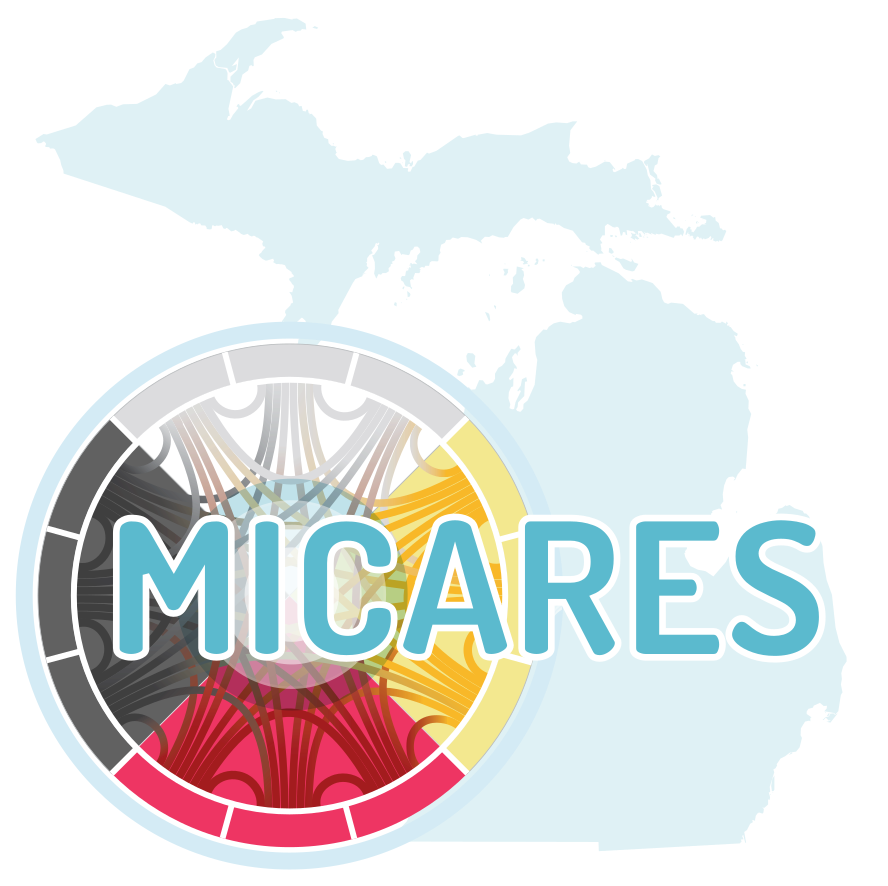 The objective of this Growing Convergence Research project is to lay the foundations for a convergent, transdisciplinary field of study focused on understanding transitions in socio-technological systems. This project aims to converge social science theories of values and motivation with engineering and economics understandings of technological feasibility to develop a comprehensive understanding of how and why energy systems, in particular, are reconfigured to include renewable energy resources. This project brings together scholars from resource management, chemical and materials engineering, electrical engineering, sociology, energy policy, philosophy of science, and regional planning to simultaneously explore the social, cultural, and technological dimensions of energy system transitions.
The objective of this Growing Convergence Research project is to lay the foundations for a convergent, transdisciplinary field of study focused on understanding transitions in socio-technological systems. This project aims to converge social science theories of values and motivation with engineering and economics understandings of technological feasibility to develop a comprehensive understanding of how and why energy systems, in particular, are reconfigured to include renewable energy resources. This project brings together scholars from resource management, chemical and materials engineering, electrical engineering, sociology, energy policy, philosophy of science, and regional planning to simultaneously explore the social, cultural, and technological dimensions of energy system transitions.
The project will investigate energy system transitions in multiple communities (Anishinaabe Tribal Nations and non-tribal Michigan communities) that vary along characteristics key to understanding energy transitions - including rural vs. urban, renewable energy sources, degree of transition, governance, and type of utility provider. Project sub-teams will a) engage with community partners to explore how communities understand and envision energy transitions; b) examine risks, barriers, and opportunities for energy transitions; and c) develop an integrated spatial model and decision support tool to study the trade-offs between strategies, spaces, and futures.
Funded by: National Science Foundation
Award #: 1934346
Collaboration with:
Other Projects
Explore Computer Science Research Workshop
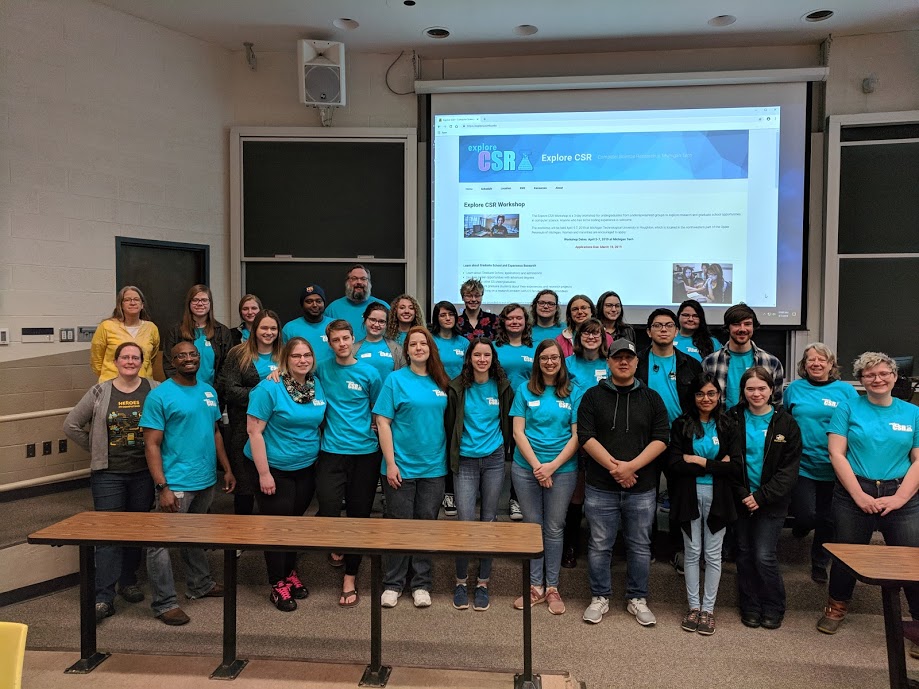 The Explore CSR Workshop is a 3-day workshop for undergraduates from underrepresented groups to explore research and graduate school opportunities in computer science. The workshop is for anyone with some coding experience.
The Explore CSR Workshop is a 3-day workshop for undergraduates from underrepresented groups to explore research and graduate school opportunities in computer science. The workshop is for anyone with some coding experience.
The first workshop was held in April 2019 with 26 participants from 6 different schools. A second workshop was planned for April 2020 but was canceled due to covid-19. A new event is planned for the 2020-2021 academic year.
Funded by: Google
Bayesian Networks and Feature Selection
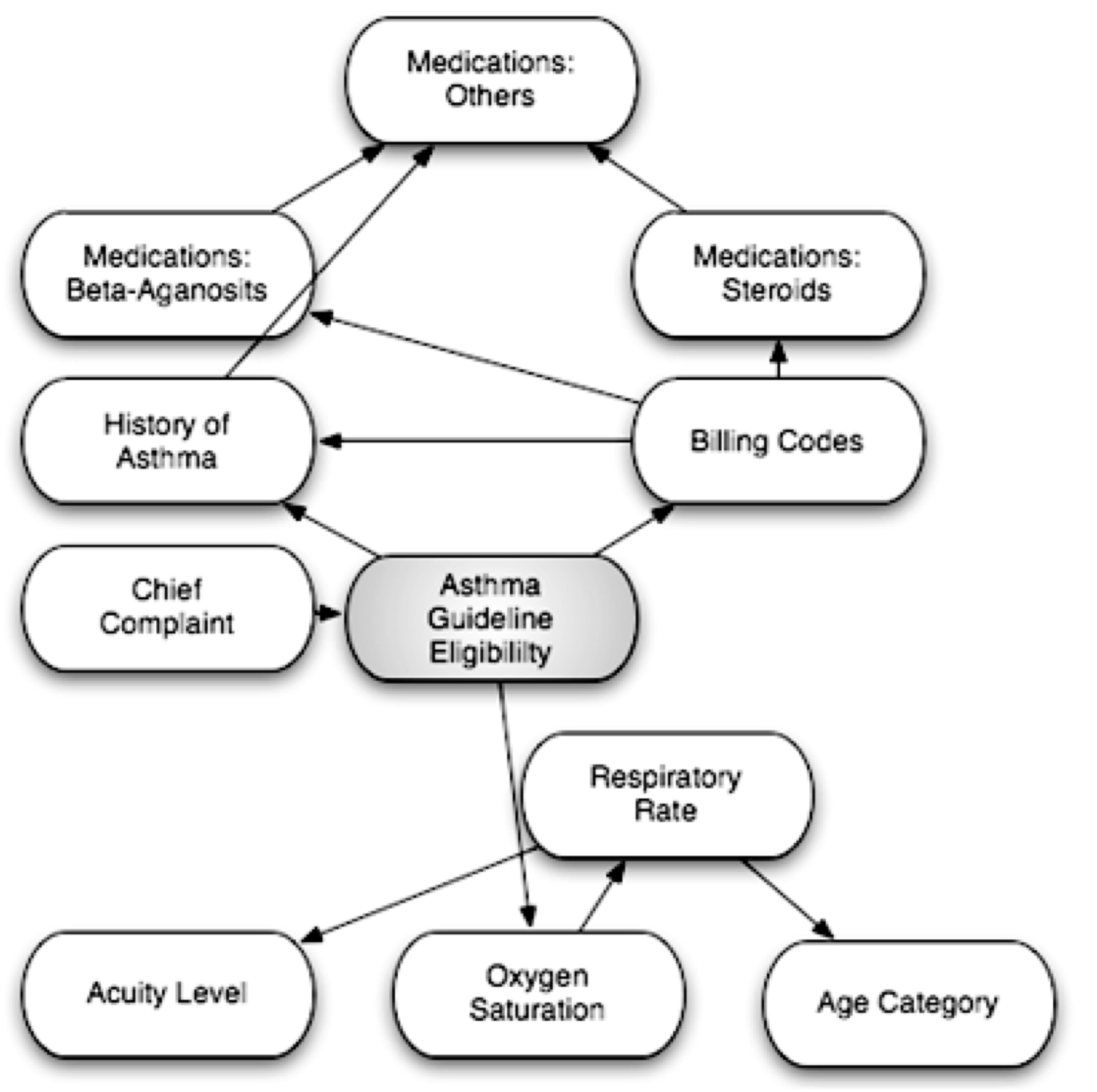 The research creates methods for learning the structure of Bayesian networks and feature selection. Methods for learning the structure of Bayesian networks rely on ideas from local learning, contraint-based, and search-and-score techniques.
The research creates methods for learning the structure of Bayesian networks and feature selection. Methods for learning the structure of Bayesian networks rely on ideas from local learning, contraint-based, and search-and-score techniques.
Persistence in Engineering and Computer Science
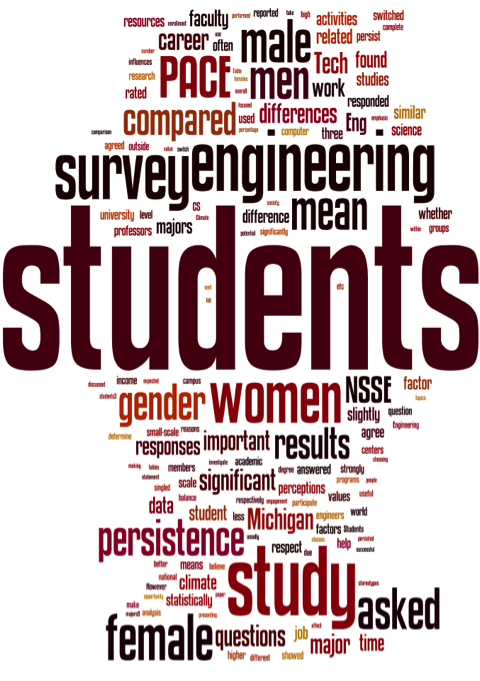 This on-going project looks at local and national surveys to understand student persistence. The local survey was designed to investigate aspects of persistence and the reasons behind switching majors. An analysis was performed to determine what impacts student persistence including factors such as major, gender, student-student and student-faculty interactions, and career opportunities. The project focuses on engineering and computer science undergraduate students.
This on-going project looks at local and national surveys to understand student persistence. The local survey was designed to investigate aspects of persistence and the reasons behind switching majors. An analysis was performed to determine what impacts student persistence including factors such as major, gender, student-student and student-faculty interactions, and career opportunities. The project focuses on engineering and computer science undergraduate students.